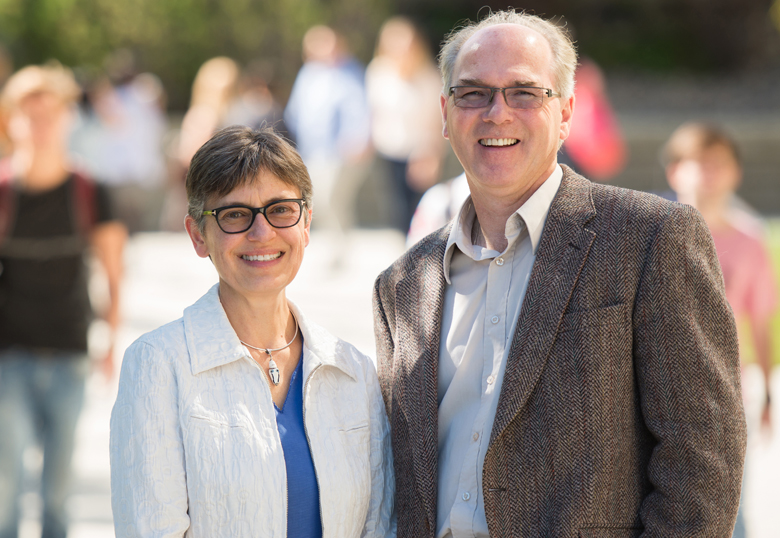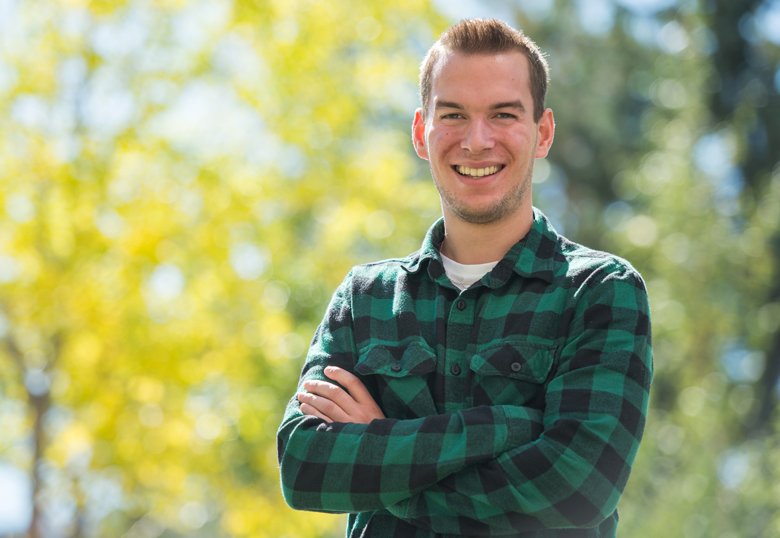As dean of the Faculty of Health Sciences and an academic research project officer, respectively, Dr. Chris Hosgood and Jacqueline Preyde contribute to the University of Lethbridge in very different ways. But as co-chairs of the University’s 2015/2016 Supporting Our Students (SOS) campaign, Hosgood and Preyde share a combined goal: to help create a healthy and successful U of L student body.

Hosgood has been at the U of L since 1988, and dean of Health Sciences for the last decade. Preyde worked at the University in the 1990s as a sessional instructor, then returned in 2008 as an academic advisor before moving to her current position last year. They may see the University’s SOS initiative from different vantage points, but both agree that the program is an essential component in creating a vibrant and cohesive University campus.
“The U of L isn’t a huge university, but it is a hugely vital and energetic place,” says Hosgood. “The thing I’ve always liked the most about the U of L is that it feels like one big family. The SOS program is one way that family is visible and has a positive impact.”
Supporting Our Students is an initiative whereby U of L faculty and staff make monetary donations towards existing or new scholarships and bursaries that are distributed among the student body each year. So far this year, 239 current staff members and retirees are participating in SOS, a figure that Preyde and Hosgood are proud of, but would like to see increase in 2015/16. The committee’s goal for this next year is to increase the number of staff donating monthly to support our students.
“We want to get as many people involved as possible, whether it’s through contributing to the fund or participating on the SOS committee,” says Preyde. “Giving back to our students does so much for the University as a whole. It would be great if everyone who works here was part of it. We’re helping our students, which of course is the main goal, but the ripple effects from that are tremendous. When students receive scholarship and bursary support, they can worry less about their finances and can concentrate on their academics, helping them to be successful, happy students.”
Hosgood believes that the effects of SOS funding on students go a lot further than just relieving financial pressure.
“I actually think it’s a health issue,” says Hosgood. “Many students are working two, even three jobs to help subsidize their education. Many of our students have families. There comes a point when students reach a level of pressure that’s not only detrimental to their academic success, it’s detrimental to their well-being, both physically and mentally. We have the opportunity as faculty and staff to alleviate some of that pressure through SOS.”
Joel Snodgrass, a fifth-year combined science and management student, knows the difference a bit of funding can make firsthand. Snodgrass applied for and received a number of scholarships over the course of his studies, totaling more than $12,000.

“The scholarships motivated me; they encouraged me to focus on my studies and to do well,” says Snodgrass. “When someone believes in you enough to provide funding, that’s huge. It changes the way you think about your education and improves your entire university experience. The scholarships I received made it possible for me to get involved on campus, to volunteer and participate, rather than having to work a part-time job. I think it’s rounded me out as a person and will give me a head start when I begin my career.”
Preyde and Hosgood see students like Snodgrass every day, and see their own financial contributions to SOS as minimum input for maximum benefit.
“It’s an investment in the future,” says Hosgood.
“And a way to better our entire University community,” adds Preyde.
Join Jacqueline and Chris, and support our students today.
